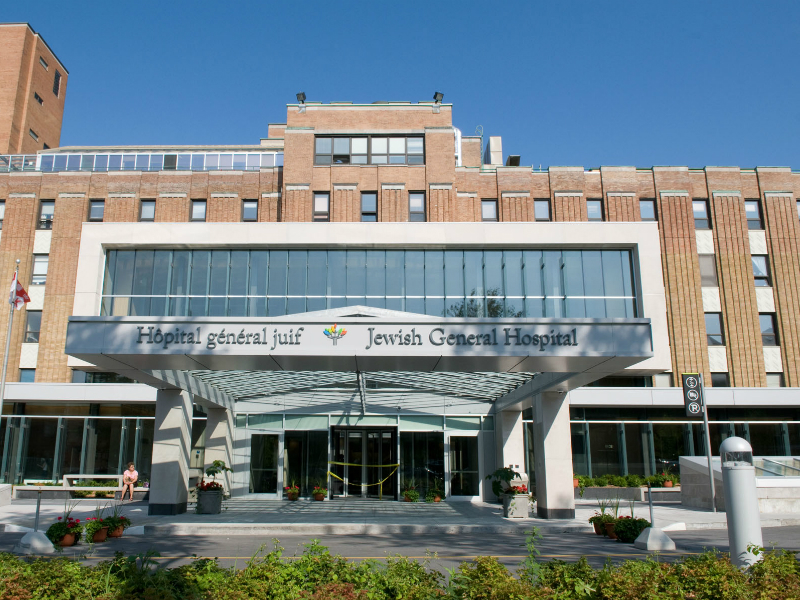In a survey for Newsweek, Montreal’s Jewish General Hospital (JGH) is ranked among the top 100 hospitals in the world, and places first in Quebec and fourth among Canadian hospitals.
“It is extremely gratifying to see the results of this survey, which we are all extremely proud of,” said Dr. Lawrence Rosenberg, president and chief executive officer of CIUSSS West-Central Montreal, the public agency that administers the JGH.
He added that the survey “reflects the many ways in which the JGH continually strives to improve quality, delivery and access to treatment and care. In whatever success we achieve on behalf of our patients, the credit belongs to members of our staff in all fields, as well as our generous donors and dedicated volunteers.
The article doesn’t say what the JGH’s spot was among the 100.
In the article that accompanies the list, Newsweek notes: “Of all the industries on the threshold of transformation, none is more politically contentious, tightly regulated, scientifically significant or economically important than health care.
“Hospitals around the globe will drive—and be shaped by—much of this disruption…The hospitals on this list are at the forefront of adapting to these new challenges, while providing top-notch patient care.”
Rosenberg said the JGH, with which he was associated for decades, including serving as executive director, has aimed throughout its history to provide care that is technologically sophisticated, without losing sight of the importance of tending to the emotional needs of patients and their families.
The survey rated hospitals in 11 industrialized countries: Canada, the United States, the United Kingdom, France, Germany, Israel, Japan, Switzerland, South Korea, Singapore, and Australia.
READ: NEWSWEEK NAMES ISRAEL’S SHEBA MEDICAL CENTER ONE OF WORLD’S 10 BEST HOSPITALS
The Newsweek article explains that the magazine entered into a partnership with Statista Inc., a global market research and consumer data company, to devise the ranking.
One thousand hospitals were selected, based on recommendations from medical professionals, patient survey results and medical performance indicators.
For the recommendations, Statista collaborated with GeoBlue, a provider of health insurance coverage and technology-related solutions, in inviting tens of thousands of doctors, hospital managers and other health-care professionals to participate in the online survey.
The top Canadian institution on the list is the Toronto General Hospital, which is seventh overall among the 100 cited. The other Montreal hospitals among the best 10 in Canada are the Montreal General Hospital and Royal Victoria Hospital, both part of the McGill University Health Centre.
In related news, the JGH has become the first hospital in Canada to enrol a patient in an international clinical trial that is part of a study on whether some breast cancer patients can be treated successfully without surgery.
Dr. Mark Basik, a surgical oncologist at the JGH’s Segal Cancer Centre and a senior investigator at its Lady Davis Institute, is leading the effort that focuses on women who show no signs of residual cancer following a course of chemotherapy.
He is the principal investigator on a National Institutes of Health National Cancer Institute trial that is recruiting 175 patients at 338 sites to test the accuracy of needle biopsies of the breast in detecting any remaining cancer cells after chemotherapy has been completed.
Approximately 20 per cent of breast cancer patients show no trace of the disease after chemotherapy, Basik said.
“Patients often ask, ‘do I still need surgery?’ Because of lingering doubts of stray malignant cells, we have been compelled to perform surgery to remove tissue for the sake of absolute certainty,” he said.
“But, what if we could get very strong proof that the disease has been eliminated without operating? We would be able to spare our patients the pain of surgery and the trauma of partial or full mastectomy and reconstruction.”
The researchers believe that, using a combination of imaging technology and taking needle biopsies of the area where the tumour was located, doctors will be able to determine whether the cancer has been eradicated.
Patients will receive drugs followed by mammograms, ultrasounds and magnetic resonance imaging, in addition to the needle biopsies. They may then undergo the less-invasive lumpectomy.
Basik has been working for close to a decade to convince patients and the medical profession that this approach could work.
“There are those who have convinced themselves that only radical surgery can excise the cancer, but we know this is simply not the case,” he said. “Our entire thrust has been to reduce the use of radical procedures in favour of those that can be effective with less pain and loss of tissue.”
